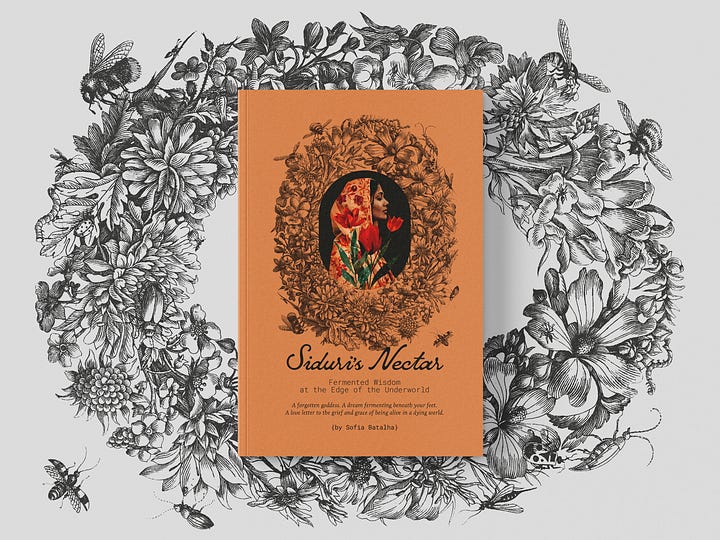I’m in an unsettled and frozen state of limbo. Scattered mind, rigid body, exhaustion.
There are moments when words seem too small for the world we inhabit.
Moments like these.
War is rising. Genocide and ecocide unfold daily, no longer hidden behind polite veils. The fascist logics of purity, separation, and control swell once more like an ancient fever. And beneath it all, the Earth herself trembles under the long inheritance of extractive violence. But this crisis did not begin yesterday; it’s not new. In fact, the world is perishing from an ancient infected wound.
The Long Severing
For years, I have been asking: Where does this story come from?
Not only the wars and the genocides we see today, but the deep cosmology that made them possible, the myth of separation, domination, exceptionalism … the conquest of Life itself. The festering rupture bleeding in our modern hearts and land.
In The Sanctuary, I turn toward the place of my ancestors, the land where my bones rest, the Atlantic facade of the Iberian Peninsula, with its colonizer ways, and listen for what lies beneath its historical amnesia.
Before empires, Christianity, or overlapping conquests, this land was woven with wild stories of serpents and rivers, stones and grandmothers, moon cycles and animal kin.
Not pure or untouched, but relational.
The great severing arrived slowly, through the colonization of land, bodies, and stories. Crept over millennia. Through the exiling of the old goddesses and the cutting of forests, through the mechanization of knowledge, and the extraction of life into property. Amnesia settled in. Numbness lurked after.
Not Another Nostalgia
The Sanctuary is not a longing for a lost golden past. I am not seeking an impossible return, nor am I chasing some (dangerous) fantasy of cultural purity.
Purity is itself a symptom of the disease.
Instead, The Sanctuary is an act of listening. A way of sitting with the remains of entanglements, losses, violences, and survivals. A way of noticing the broken, hybrid, sometimes unbearable complexity of where we are, and still sensing the whispers of the other-than-human world beneath it all. The old stories are not dead, not been fully domesticated. The land and the body remember. For even amidst the collapse, Life keeps inviting us back into reciprocity, grief, humility, and feral joy.
Between Grief and Response-ability
If my work belongs anywhere, it belongs at this trembling abyssal edge, between grief and response-ability, using Donna Haraway’s term, collapse and kinship, enchantment and the small daily acts of re-weaving.
The fascisms rising now are the terminal convulsions of a story that refuses to face its own death. The Sanctuary is my way of standing at the threshold, not to deny the darkness, but to embrace it. To remember other logics, older relationalities, wilder ways of being in an other-than-human world that continues, despite everything, to pulse with life.
If these words reach you in the heaviness of this moment, may you feel supported. We do not walk alone.


Positionality Statement
These works emerge as offerings from a body situated in specific inheritances, as a white, able-bodied, cisgender woman from the Iberian Peninsula, shaped by the layered sediments of Global North modernity and its colonial, patriarchal, and extractive logics. I do not speak from nowhere, nor do I offer these texts as universal claims or authoritative knowledge. I’m definitely not a specialist nor a prophet (lol). I’m just curious, on the spectrum of cynicism. I’m a humble listener and weaver, remembering and engaging with what pulses beneath and beyond my own cultural training.
The stories, dreams, and research that animate The Sanctuary, Siduri’s Nectar, and Tales of the Serpent and the Moon are not presented as retrievals of some untouched indigenous purity, that would only replicate the violence of romanticization. Instead, they move with the cracks and fractures of severed lineages, fragments, and shards that remain accessible through dreams, rituals, myths, ruins, and the metabolic grief of historical disconnection. They are invitations to process what I carry in my body, both the privileges and the losses of being entangled within European modernity’s severances from land, kin, and cyclical relationality.
In this sense, the Iberian Peninsula offers not only geography but also a dense matrix of eco-mythological echoes, pre-agrarian cosmologies, animist threads, matrilineal knowledges, and seasonal wisdoms that were violently subjugated over millennia. The narratives I engage with attempt to honor these submerged voices without claiming ownership over them. They seek neither to appropriate nor to restore, but to move alongside, humbly entering conversation with what still lives in the bones of the land, in the layered griefs, and in the silent singing of stones, rivers, and old trees.
This is not a project of escapism nor a solution-making endeavor. It does not aim to heal the trauma of modernity through simplistic or fabulated repair. I sit with sediments of complexity, paradox, and grief, the anguish of extinction, domestication, severance, and assimilation. I write from within modernity’s habitat, attempting to loosen its structure, making space for relational repair and remembrance. I stand on the cracked ground of Atlantic-Iberian histories that still whisper through enchanted tales, bone memories, and ancestral landscapes.
May these texts serve not as finished blueprints, but as offerings for others who are also navigating the intricate, painful, and necessary work of relational re-membering. A fierce and gentle work that refuses extraction, superiority, or purity, and instead roots itself in accountability, complexity, and reciprocal belonging.
I’m working to make all posts open to everyone. Paid subscriptions help support the depth of this research, allowing these narratives to continue gestating outside institutional and market demands. You’re invited to support if you feel called, but your presence here, as a living witness, is already part of the story.
Honor hystera. Re-member. Response-ability. (Un)learn together.






Such a wonderful book! I need to get a new copy because I gave mine away!